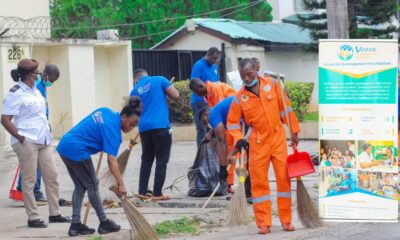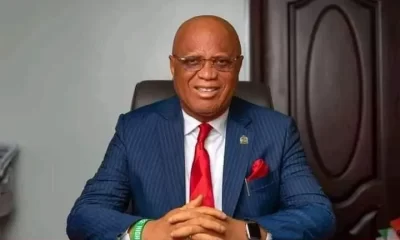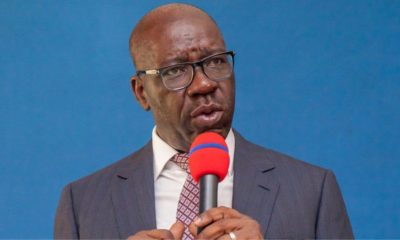Opinion
Nation In Need Of Servant Leader (1)
I have heard people say time without number, that Leadership is everything in the art and process of governance. That Leadership is an organisation or society personified.
John C. Maxwell, in one of his best selling books titled, “Leadership Gold” says, “every human organisation. rises and falls on Leadership”.
This is simply to say that the success or failure , progress or retrogression, of a human society is inevitably a function of Leadership. The choice of a leader is the most critical factor in the development of a nation. It is a sine qua non in the value chain in the realisation of set goals of any society or organisation.
The political leadership is at the helm of affairs of all sectors of a nation. Therefore, it is not out of place to blame the leadership for the myriad of social and economic challenges, security upheavals and educational problems.
Taking a cursory and objective look at the miscellany of hydra-headed problems that bedevil Nigeria, the purported giant of Africa, one can say without an iota of doubt, and without a fear of contradiction, that Nigeria needs a leader—I mean a servant leader; one who sees himself as a steward, holding the resources of the people in trust. A leader, who understands that Leadership and accountability are an inseparable pair, like the snail and its shell. A leader who has not only cultivated passion for accountability, but is seen to be accountable.
Leadership is a trust, not a right. Though successful, result – oriented and effective leadership requires teamwork, a leader takes the blame or praise for the failure or success respectively, of his administration.
The choice of a leader in a democratic governance is essentially, in an ideal situation, the prerogative of the people. Every leader so elected or selected derives his legitimacy from the people.
The God factor in the choice of a leader depends greatly on the thinking and behaviour of a people. If a people are corrupt, God will always give them a leader that is corrupt, especially, when such a leader is a product of corrupted and perverse selection or election processes.
A nation such as Nigeria, with abundant human and natural resources could not have gone through the orgy, harrowing and painful experiences we find ourselves today, if we got the leadership issue right.
In the last few years, Nigeria has become a metaphor of hardship for the less privileged majority transiting from one gory and gloomy scenario such as insecurity to untold economic hardship.
Nigerians are graduating from one level of protracted experiences to another. The pump price of premium motor spirit (petrol) is fluctuating between N165 and N250 per litre (from N75 eight years ago) in a nation that is the sixth largest producer of crude oil. Consequently, the transport fare has increased outrageously and the prices of food and other items are astronomical. Kerosene which is the product of the down-trodden is beyond their reach as a 25-litre Jerry can is sold for N10,000. This is an anomaly. Most Nigerians live in abject poverty. There seems to be no flicker of hope, no light at the end of a long, dark tunnel except by divine intervention. Salary earners or those on fixed income are the worst hit as salary exhausts before arrival.
Ghana, a small English speaking West African country got it right some three decades ago, and today, it is a resort of academic for privileged Nigerians. While for three months, lecturers of Nigeria’s public universities are in a protracted battle with the Federal Government with no end to the impasse in sight. Students roam the streets not being certain when to graduate from a programme that has a duration.
I remembered when I was younger, between the late seventies and early eighties, Ghanaians were jeered and disparagingly told to go. The “Ghana Must Go” slogan was translated to a bag. They were virtually every where, engaged in menial jobs to eke out a living. Those experiences are now history. Today, Ghana is better economically, academically, socially etc.
Ironically, today it is the turn of Ghanaians to tell Nigerians in Ghana to go. What a shame!
The economic situation of Nigeria is not improving at all. And no improvement in sight even as the World Bank speculates that it will take thirty years to remedy the economic trauma the leadership of Gen. Muhammadu Buhari (rtd) has plunged the nation into, because of unpopular economic and financial policies and borrowing.
Little wonder, Nigerians in America prefer to remain in prison instead of returning to Nigeria. In their valuation, the living conditions of a prisoner in America is better than that of an average person that is free in Nigeria.
Why would students of Nigeria’s extraction in Ukraine initially choose to remain there even in the midst of Ukraine—Russia war with the several loss of lives and property. In my considered opinion which is not far from the truth, Nigerian students adjudged war-torn Russia and Ukraine far safer in security, economically better, educationally balanced and socially stable than Nigeria—the land of their birth where insurgents, terrorists and atrocities of varied kinds are carried out with impunity. A land where corruption, like a phoenix is treasured, so much so some public office holders are richer than some states. Looting of public treasury and common wealth is a norm.
I grieve for my fatherland. Nigerians should rise to protect and defend the labour and ideals of our founding fathers that earned the nation the sobriquet “the Giant of Africa”, not the weeping baby the nation is known today.
This change is possible through an intellectual and electoral revolution. Nigerians should discover the power of the ballot and brace up to defend their vote at all levels of elections: State Constituency, Governorship, Federal Constituency, Senate and the Presidency.
Every eligible voter should be committed to intentional change for the good of the country by resisting the penchance of accepting peanut for mortgaging the conscience and the destiny of our generation and posterity.
A concerted determination to foster and catalyse change in a detribalised perspective, is the greatest need of this country. Nigeria needs a leader. Nigeria needs a servant leader.
(To be concluded)
By: Igbiki Benibo
Opinion
Nigeria Must Not Become A Wasteland
The political, business and economic classes seem to lose sight of the fact that a land without a people is in another word known as a wasteland. And what is a wasteland?
A wasteland is a society uninhabited by a people, and therefore the exploiters, manipulators and abusers of the commonwealth will have nobody and nowhere to ply their trade, whatever that may be. This is a fact that most of them seem to have so missed in their blind rush to rob the common people of everything, including their sanity.
Religious leaders are part of this ruthless group, but we decided not to mention their insidious role in the exploitation of the commoner because we have spoken about them in an earlier article on the subject of corruption. The word ‘corruption’ is not supposed to be spoken in the same breath with the phrase ‘religious leaders’, but what is abnormal elsewhere is very normal in Nigeria, especially when it comes down to the exploitation of the common people.
**It is a known fact that despite its abundant resources and potential for extreme wealth, Nigeria is one of the backward nations in which only an insignificant number of people benefit from the commonwealth to their satisfaction and, above all, wish.
This is the way they want it, because theirs is a group, regardless of members’ religion and race, that does not welcome gate crushers, until it is absolutely necessary to do so. And so is mostly done by way of marriages. It is like a secret society, the secret of which it does not want outsiders to know and share with others outside the clique. It is a clique that non members are fiercely not allowed to know what goes on in it. Along the way, a non member may even lose his life with the members’ fierce protection of their exclusive conclave.
As stated earlier, when marriage calls with a ‘commoner’, members try all they can to disallow it, but when that is not achieved, it is reluctantly agreed upon until the ‘common’ party is fully integrated into the conclave. And so, a new member is the reluctantly born into the otherwise exclusive group. And all of the members of the group belong to one religion or the other, with, maybe, some holding firm to the traditional beliefs. Still, they feast on the commonwealth as if it was their own to do as they please.
It would seem that we believe in a different God. Muslims among us believe that our God is a just God, Who does not condone injustice on one over another, and that everyone must account for their actions in what we generally call ‘the hearafter’ before God (SWT). It is my belief that some members of this group do not believe in accounting for what they did while they were on this earth, even though those who believe in Christianity believe that Prophet Isa (AS), (Jesus Christ) ‘died for their sins’. This much is evident in their blind quest to exploit the common person, and they keep ‘acquiring’ from the commonwealth that which they, their children and grandchildren cannot spend in a sensible manner in their lifetime, try as they may.
Yet, the common person celebrate these people as heroes, which gives them the licence to continue their exploitation (of the Common person) of what by the laws of the land belongs to all. Celebrated on these shores, these people steal the Commonwealth blind and bring out a pittance by way of supposed charity or ‘assistance’ to the poor in the name of help. How is it possible to help a person from the proceeds of what you ingeniously or forcefully stole from him? This only happens in the land of the Mafia or in Nigeria, which is controlled by its own mafia. The earlier the Nigerian mafia is done away with, the better for the common person, now in the pole position to utilise, defend and enjoy the Commonwealth, as the laws of the land meant it to be.
Abdu Malumfashi
Malam Malumfashi writes in from Abuja.
Opinion
Other Sides In Junior Pope’s Death

The tragic boat mishap of Wednesday, April 10, 2024, which claimed the lives of popular Nollywood actor, Mr John Paul Obumneme Odonwodo, popularly known as Junior Pope, and four others, has sent shock-waves across the Nigerian movie industry, and set the social media buzzing with reactions.
A contingent of 12 movie crew members had set out for a boat journey from the River Niger Cable point, a waterside jetty at Asaba in Delta State, to cross to the other side of River Niger, into Anam, a riverine community in Anambra State, for the shooting of a movie set titled ‘Another side of Life’ produced by Adanma Luke. Unfortunately, a series of avoidable events culminated the journey into an ill-fated expedition that sent fives lives to ‘the other side of life.’ The incident made the movie’s eventual ban a nullity, having played-out its symbolic meanings in real life while in the making, rather than on envisaged screens.
An avoidable incident, it exposed our society’s casual attitudes towards marine and general safety, as well as our endemic superstitions, while telling, on several flaps, other side tales of reality in the accounts of what transpired during the production, or rather, play of Adanma’s ‘Another side of Life.’
While veteran actor and Senior Adviser on Military Relations to the President of Actors’ Guild of Nigeria, Mr Steve Eboh, claimed he missed joining the ill-fated boat because he arrived too early before the crew, and had to go back, the producer, Adanma Luke, claimed she missed it because she came too late.
A journey’s jolly take-off from Asaba, Delta state, which ended tragically in its return from the other side in Anambra State, proved to be a rascally journey that showed the other side of rascality, even as T. C. Okoye claimed that pre-performing of obeisance to some marine spirits saved his life. But it was T. C. Okoye who had to hang unto a boat’s anchor in the face of death, rather than rely on the powers of the spirits he had appeased with Fanta, to await rescue from mortal men – sensible men, whose advise that one needs wear life jack during marine journeys – he had forsook, yet gave glory to his rituals after rescue.
Conversely, one may flip the flap to consider the other side of T. C. Okoye’s rituals to ruminate on other possibilities. Could the ringing of bells, spraying of money and snacks, and pouring of Fanta, have evoked the anger of the ‘marine spirits’ as rumoured, or distracted the boat driver, to the point of accident? And as reported by The Punch, what’s the significance of T. C. Okoye ‘dashing’ ritual money to innocent children whom circumstance made to be by the riverside?
Also, the argument by Mr Steve Eboh, that “If the star actors in that boat had wanted to wear life jackets, they would have been given the jackets” holds no ground, because the guild, as well as all the marine transport stakeholders, should have enforced strict safety compliance by all voyagers. It is therefore commendable that the Anambra State Commissioner of Police, Aderemi Adeoye, has ordered exhaustive investigations into the matter to determine criminal liability of all persons involved.
However, in the melee of pandemonium that accompanied rescue efforts, Nollywood celebrities, our society’s supposed role models, prioritized superstitious rescusitation over sure medical practice, rushing victims between spiritualists and hospitals, until a ‘pope’ whose work and journey had bound with the superstitious, died amidst superstition. Indeed, it’s during crises, when people care less about ‘packaging,’ that truth and the real personality of humans stand bare and naked.
While medical personnel who got their chance late had certified Jnr Pope dead, our star-persons held unto their spiritual advisers who claimed his spirit coming back to life, up until reality finally dawned that pope’s spirit has permanently crossed to the other side of life.
Regrettably, the reality has not fully dawned, otherwise three corpses shouldn’t have been buried by the riverside as dictated by spiritualists, and Jnr Pope’s family shouldn’t be worried about what would happen, as rumoured threatened of his three children, if his corpse is not buried by the riverside. However, it appears that having encountered the influence of a frontline celebrity, the spirits have turned capricious by bending divinely demands to accepting two cows, as rumoured, in exchange for Jnr Pope’s corpse being buried elsewhere.
According to the Anambra State Police Public Relations Officer, SP Tochukwu Ikenga, a team of rescuers comprising men of the Anambra State Marine Police Command, the National Inland Waterways Authority (NIWA) and the Maritime Workers Union of Nigeria, with the aid of fisher men, rescued seven persons alive to the Anambra side, while two retrieved corpses were sent across the other side, to the Delta State Marine Police Command jetty where Nollywood officials stood waiting. Of other three victims, two corpses were rescued next day, while a third was thrown out by river tides, all of whom; Abigail Fredrick (Vice Chairman of Costumer Designers Guild of Nigeria, and Akwa-Ibom State-born make-up artist), Precious Oforum (Sound engineer) and Joseph Anointing (Gaffer), have since been buried by the riverside, according to local belief.
However, what the police PRO’s statement didn’t reveal is if Jnr Pope’s corpse was sent to the other side in Delta after all the back and forth between spiritualists and medical personnel within Anambra, or if it was sent straight upon rescue to Delta state, but mysteriously found its way back to Anam, on the Anambra side.
It’s unfortunate that Nollywood which set out in its early days to expose superstitious beliefs and practices in our societies, in the hopes of enlightening the minds of the masses, and to curb the manace, has made many believe it’s rather reinforcing superstition in the ways it condicts the movie industry business.
Members of the showbiz in general, now appear to be key protagonists of superstition to the point that, being perceived as role models, so many youths have been drawn to lives of unrealistic dreams and materialism, which often get pursued through ritualism, with its attendant crimes.
Joseph Nwankwo
Opinion
The Value Of Books And Reading
The quality, quantity and diversity of books produced by a society are important indicators of that society’s level of development. . . .”–Valdehusa (1985).
April 23 of every year is marked around the world as ‘World Book and Copyright Day.’ Also known as ‘International Day of The Book,’ it is a Day set aside by the United Nations Educational, Scientific and Cultural Organisation (UNESCO), to promote reading, publishing and copyright. The Day aims to change lives through a love of books and shared reading. The theme for the 2024 ‘World Book Day’ is: “Read Your Way.” This year’s theme calls on everyone to let go of pressure and expectations, giving children a choice – and a chance to enjoy reading.
According to Audrey Azoulay, Director-General of UNESCO: “Books have the unique ability to entertain and to teach. They are at once a means of exploring realms beyond our personal experience through exposure to different authors, universes and cultures, and a means of accessing the deepest recesses of our inner selves.” Therefore, the power of books should be leveraged to combat isolation, reinforce ties between people, and expand our horizons, while stimulating our minds and creativity. It is critical to take the time to read on our own, or with our children.
Did you know that The Bible stands out as the most widely translated and distributed book worldwide? Yes, the Bible is by far the most widely translated and distributed book! Its wisdom has reached and helped more people than any other book or publication. 96.5 percent of the world’s population has access to the Bible. The Bible is available (in whole or in part) in over 3,300 languages, and the estimated number of copies of the Bible produced is 5billion, far more than any other book in history. Which other book(s) do you enjoy or have you enjoyed reading? As for me, one book I am currently enjoying reading is a 400 – 500 page healthcare handbook titled, Where there is no doctor, authored by David Werner. It is a very valuable healthcare handbook that I have found to be very very beneficial! In fact, this healthcare handbook has been fondly described by some as “the ‘Bible’ of health education,” and I strongly recommend that every family should have a copy of this book at home. Apart from this book, I also enjoy reading for pleasure children’s books, such as those I have found on booksmart.worldreader.org and www.africanstorybook.org. What about you? What books have you enjoyed or do you enjoy reading? Do you know about the book industry? There are three major sectors of the book industry. They are: publishers, booksellers and libraries.
Book publishing is channelled towards promoting learning and expanding knowledge. In a strict sense, book publishing starts from the point of conceptualisation of the ideas for the book by the author, and ends at the very last stage – the end-user (the reader). The history of book publishing in Nigeria can be traced to the establishment of the very first publishing press in Calabar, in 1846, by Rev. Hope Waddel of the Presbyterian Church of Scotland Mission. The press was used to print Bible lessons and later arithmetic books for schools.
In 1854, another Missionary based in Abeokuta, Rev. Henry Townsend of the Church Missionary Society (CMS), established a Press. Five years later (1859), he used it to print the very first newspaper in Nigeria – ‘Iwe Irohin.’ Thereafter, notable Nigerians like Herbert Macaulay established the first indigenous newspaper in 1926, called Lagos Daily News. Also, in the same year, Daily Times made its debut. In 1949, Oxford University Press (OUP) floated a sales outlet in Nigeria. This action attracted many foreign-based publishing firms to Nigeria, such as Macmillan, Longman and others. The first published book in Nigeria by OUP was released in 1963, when its local branch published ‘Ijala Ere Ode’, a Yoruba poetry genre by Oladiipo Yemitan. Aside from the foreign companies, many other home-based publishing houses were architected by indigenous entrepreneurs. The book publishing industry in Nigeria has continued to enjoy drastic growth ever since.
However, in the last few decades, the Nigerian indigenous book publishing industry has experienced a downturn due to numerous challenges facing the industry, including: book piracy, proliferation of unqualified author -.publishers, lack of capital, and inability to provide adequate numbers of high-quality books.
Other challenges include: poor reading culture, infrastructural decay, dearth of expertise, incessant rancour among the major stakeholders, and so forth.
Therefore, here are some suggestions for developing our book publishing industry in Nigeria: Stakeholders such as government, publishers, authors, regulators, booksellers, libraries, and readers should cooperate among themselves and contribute their quota immensely towards the development of a virile book publishing industry. Private investors such as banks, finance houses and influential individuals should participate, especially in terms of massive capital injection.
Ighakpe writes in from FESTAC Town, Lagos.
Daniel Ighakpe
-

 Nation3 days ago
Nation3 days agoVCDF in Partnership with LAWMA & Iru LCDA Conducts ‘Street Hygiene & Cleanliness’ Campaign in Lagos
-

 Niger Delta6 hours ago
Niger Delta6 hours agoEno Approves N2bn For Gratuity Payment
-
Niger Delta6 hours ago
Community Demands Employment Quota From Public, Private Institutions
-
Sports6 hours ago
RSG Set To Host School Sports Competition Soon
-

 Niger Delta6 hours ago
Niger Delta6 hours agoEdo Recruited 5,000 Workers In 7yrs – Obaseki
-
Sports6 hours ago
Rivers Referee Academy To Produce FIFA Graded Referees Soon
-

 Niger Delta6 hours ago
Niger Delta6 hours agoN40,000 Minimum Wage Disappoints C’River Workers
-
City Crime6 hours ago
Monarch Recommits To Peace, Security Of Ekpeye Land

